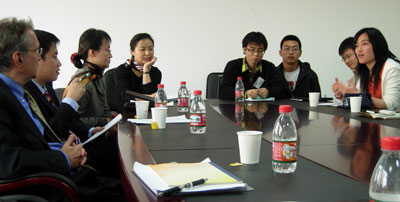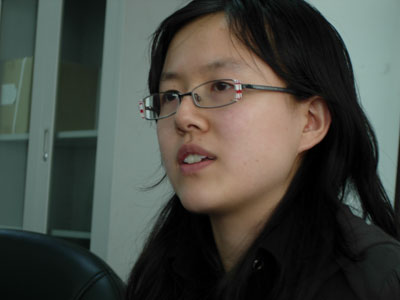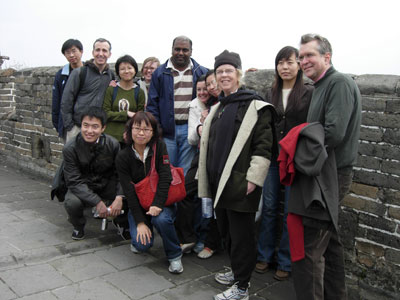
I have just returned from a week in China in my capacity as Deputy Director for International Bridges to Justice. IBJ has been working in China for the past five years training defenders and working with criminal justice policy makers to strengthen procedures for improved implementation of the criminal laws and procedures in China. I spent most of my time in Beijing with a side trip to Xian.
While in Beijing I observed a criminal law clinical class at Remnin University, discussing proposed new alternative dispute resolution regulations in The People’s Republic of China. The class was analyzing a case that their law professor was working on involving a stabbing between two men. The alternative dispute resolution option is available for misdemeanors – defined as cases involving potential incarceration for three years or less. A case would qualify as a misdemeanor based on the extent of the injury. Injuries of three centimeters or less qualify for misdemeanor status.

The students were role playing the perspective of the defense, the prosecution, and the court. The defense argued that the injury was on the left side of the face – and the defendant was right handed – not terribly persuasive. They wondered if the scar could be longer or shorter than the actual injury.
I formed the opinion that they were more concerned with form than substance. When I was invited to comment I wondered why they weren’t considering self-defense or defense of others instead of the seemingly implausible right hand left cheek defense. But rather more astonishing was the fact that this class was even taking place.
Alternative dispute resolution was being taught in a country that didn’t recognize the right to an attorney funded by the government until 12 years ago. In 1996 China revised its criminal procedure code to advance the western concepts of presumption of innocence, the right to an attorney for certain prescribed categories of cases and the prohibition against coerced confessions. China set up legal aid clinics across the country to begin to meet the demands of the new law. But these legal aid clinics didn’t have qualified lawyers in place to handle the job.
Establishing a legal framework modeled on western notions of jurisprudence and opening up legal aid offices across the country were significant accommodations. But the real challenge remains – incorporating this new legal framework into a working system. (See Jean speaking to the class by clicking the Youtube clip below.)
I am quite a few years removed from my law student days. As I observed this class I felt the students were missing the point as they mechanically attempted to adhere to technicalities in the law. On the other hand, having practiced for several decades, maybe I just developed the knack of actually practicing law. Perhaps most students attend to their legal education as literally as these Chinese students did, missing the forest for the trees.
When I graduated from law school my real education began. As a public defender I learned how to practice law in the courthouse surrounded by able advocates. But unlike me, when these Chinese students graduate from law school, they will enter into the practice of law with few role models to help them advance in their development. The tradition of an adversarial system in which the defense confronts the state on behalf of a client is unprecedented.
There is much work to be done only about 10% of the criminally accused receive appointed counsel. In the few cases where a lawyer is appointed the law does not permit the appointment of a defense counsel until 10 days before the trial. With no preparation time, appointed counsel can do little more than rubber stamp the prosecutor’s case. Interviewing a client and then investigating the case are luxuries most Chinese lawyers rarely indulge in. Even assuming that an attorney actually did endeavor to present a defense, she lacks rudimentary skills such as conducting an examination of a witness, or developing a theory of a case.
Building a viable defender community will take time. Establishing clinical programs where students can learn practical skills is a start. IBJ will begin with three law schools developing a framework for clinical education that will include 15 universities by the end of the third year.
The enthusiasm for clinical programs within the law schools is palpable. The students are bright, hard working, and extremely disciplined. This generation of young people inhabit a different China than their parents. They have had much more latitude to express themselves, worship freely, and travel outside of the country. They are extremely idealistic and want to improve their country. They recognize, if only abstractly, that the legal system can protect the rights of the impoverished, criminally accused.

Despite the fact that none of these students planned to practice criminal law they were eloquent ambassadors for their country and developing legal system. Several students made speeches – in surprisingly good English – that sounded like they might actually change their mind and switch to criminal law. After the class I received several emails from the students articulating a desire to work with IBJ to strengthen the criminal justice environment in the country.
The idealism of the IBJ Chinese staff was also inspiring. These young professionals have given up more lucrative career opportunities to join with IBJ in its daunting ambition to train the first generation of legal defenders within China.

One young lawyer lives in a boarding house in a singe room with no kitchen and a common bath. Her parents live far away and she can only travel home during the New Year’s celebration. Another young woman shares an apartment with five other women and sends all her discretionary income home to support her parents. Their only professional disappointment is they can’t do enough, fast enough.
They are correct.
The situation might seem hopeless. But somehow, observing this class and the enthusiasm of these young law students gave me a distinct sense of optimism. If the patriotic zeal of these young students is successfully harnessed into a robust adversarial legal system there is no stopping them. China is a “can-do” country. The people are hard-working and proud of their countries’ recent accomplishments and ancient historic civilization.

I saw evidence of this great civilization on my few tourist outings, first to the Great Wall of China, and then in viewing the magnificent Terracotta Warriors of Xian. The foundation of a legal system that provides significant legal protections from abuse has been staked out. With the help of IBJ and others, China’s lawyers have the potential to realize a legal system that respects the fundamental human rights of all its citizens.